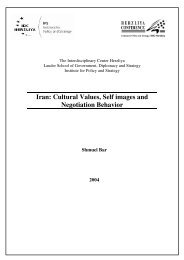Bashar's Syria: The Regime and its Strategic Worldview Shmuel Bar ...
Bashar's Syria: The Regime and its Strategic Worldview Shmuel Bar ...
Bashar's Syria: The Regime and its Strategic Worldview Shmuel Bar ...
Create successful ePaper yourself
Turn your PDF publications into a flip-book with our unique Google optimized e-Paper software.
Bashar’s <strong>Syria</strong> 383<strong>The</strong> question arises as to what extent the links of these “purged” members of the oldelite remained intact <strong>and</strong> they can still wield influence. From observations of a number ofthese figures, it seems that their influence within the party waned a short time after they lefttheir positions of power. For example: Hikmat Shihabi spends most of his time outside of <strong>Syria</strong> (Paris <strong>and</strong> the U.S., wherehis sons live). He fled <strong>Syria</strong> via Lebanon when Hafez al-Asad was on his death bed<strong>and</strong> <strong>Syria</strong>n papers leaked that he was to be indicted for corruption. Sources claimthat his fall from grace was precipitated by his close relations with Rafiq al-Hariri. Mustafa Tlas has remained Head of the Military Committee, but has apparentlyretired to his “literary” occupations <strong>and</strong> intends to write his memoirs. He does,however, maintain a certain level of influence through his sons Manaf <strong>and</strong> Firas <strong>and</strong>through the incumbent Minister of Defense, Hasan Turkemani, who was his Chiefof Staff. Tlas does not enjoy a high esteem among the educated young generation ofthe party. 66 ‘Abd al-Halim Khaddam supported Bashar upon his father’s death, but nonethelesshe was forced out of his position as vice president <strong>and</strong> retained no official partyposition. His demotion in rank apparently was due to his close relations with Rafiqal-Hariri <strong>and</strong> his criticism of his assassination. Since the tenth Congress he has beenin Paris with his family <strong>and</strong> in January 2006 he openly broke with Bashar, insinuatingthat <strong>Syria</strong> was responsible for the murder of al-Hariri <strong>and</strong> that such an act could nothave been perpetrated without the President’s acquiescence. 67 Ali Duba fell from grace after he refused to support Bashar as successor. He is knownas a gambler who spends much of his time at the gambling centers of Europe. Of histwo sons (Mohammad <strong>and</strong> Samer), one has left <strong>Syria</strong> <strong>and</strong> works as a medical doctorin the UK <strong>and</strong> the other is in prison.<strong>The</strong> rest of the “old guard” (see the Appendix) has virtually disappeared from the radarscreen of <strong>Syria</strong>n politics. Even taking into account that most of them are septuagenarians,if not older, this seems to indicate that either they have lost their power bases or have cometo terms with their retirement.<strong>The</strong> “Young Guard.” With the “old guard” pushed aside, the regime is witness to the gradualcoming of age of a young guard. <strong>The</strong> nature of the young guard <strong>and</strong> the extent to which itwields power is therefore the cardinal question. <strong>The</strong> shift from the old guard to the new elitesurrounding Bashar al-Asad has disrupted the traditional patronage networks. <strong>The</strong> youngergeneration of those same families, however, feel <strong>and</strong> demonstrate much less of an affinityto their ancestral homes or even to their “Alawite” identity; Bashar <strong>and</strong> Maher are bothmarried to Sunni women, as are the sons of Mustafa Tlas <strong>and</strong> other “sons of the bosses”(abna’ al-mas’oulin). Since most of them were born <strong>and</strong> bred in Damascus—at best in thecity of Ladhaqiyya—they even lack the distinct Alawite accent <strong>and</strong> the savvy to curry favorwithin the intricate system of families <strong>and</strong> tribes. <strong>The</strong>ir reference group is no longer theAlawite tribes they sprang from, but their associates in the military, business, or academicworlds in Damascus, most of them Sunnis.Within the young guard one can define four main groups:1. Sons <strong>and</strong> daughters of the “old guard.” <strong>The</strong>se “princelings” were born into privilege <strong>and</strong>learned from their fathers the art of wielding power in order to gain further privilege.
















